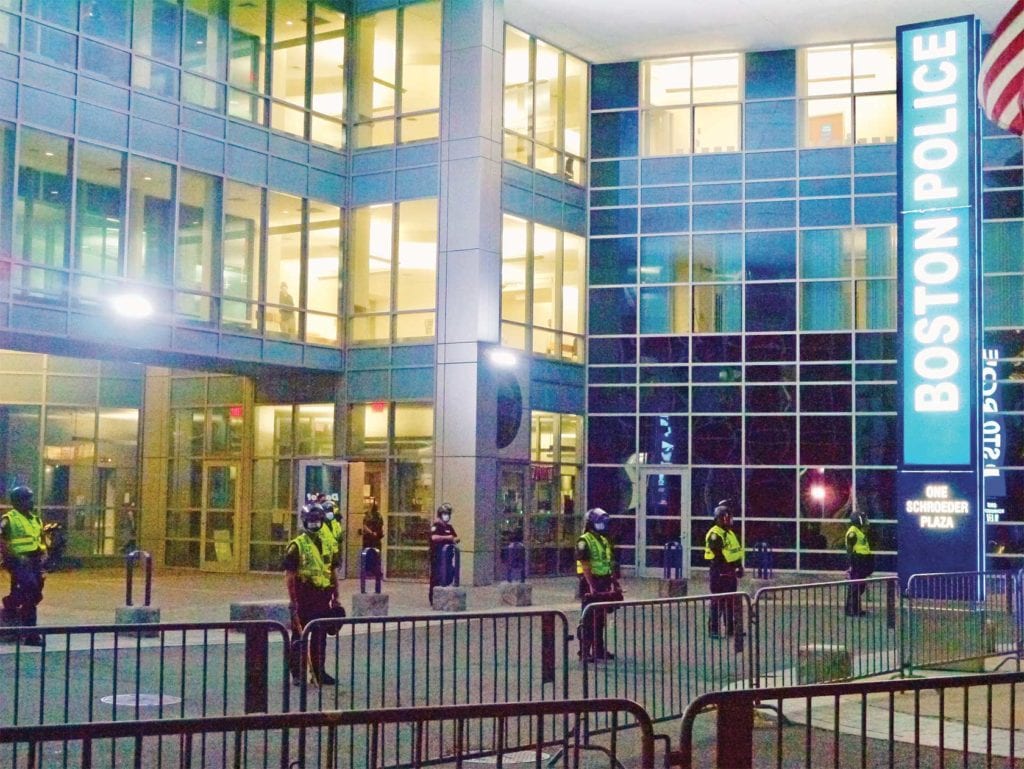Councilors vote in favor of police reforms
Civilian review board, tear gas restrictions will move forward

The Boston City Council has voted to move two police reforms to the mayor’s desk and one to the State House, results of work done in response to Boston’s racial reckoning this year.
Councilors voted to approve a new version of Mayor Martin Walsh’s Civilian Review Board, restrictions on police crowd control tactics, and a new hiring pipeline from Boston Public Schools to the Boston Police Department.
Conversations on the Civilian Review Board came to a head Dec. 10, when the mayor’s Police Reform Task Force met with the Council on their similar visions for police oversight boards. But in the council meeting a week later, agreements were made and the tone changed.
The new Office of Police Accountability and Transparency (OPAT) will house the Internal Affairs Oversight Panel (IAOP), a body that can investigate the BPD and publish data on policing. The Council and the Walsh administration have agreed that the Council can nominate members of the IAOP for the mayor to choose from. The OPAT is required to meet semi-annually with the mayor and the Council.
The OPAT also houses the new Civilian Review Board, which will receive complaints from the public. The board will be required to have a youth delegate. All of its findings will be voted on in public.
The makeup of the board is dictated mostly by the mayor and the Task force’s version, while requests were made by the council to include these new provisions.
City Councilor Lydia Edwards, who is the chair of the Committee on Government Operations, recapped the discussion between the Council and the Task Force — members of the community, some lawyers, activists and citizens, who were excited about the power this structure could have.
“I think that was heard by the [Council], and that is why we decided to come under the mayor’s ordinance inasmuch as we are going to keep that structure,” Edwards said.
The measure passed 12-1, with Councilor Frank Baker voting no.
The Council also voted favorably on an ordinance restricting tear gas, rubber bullets and other crowd control tactics used by the BPD. Though the BPD openly opposed the ordinance and did not contribute new language or amendments to it, the ordinance passed 8-5. Councilor Matt O’Malley expressed concern about the lack of cooperation from police in crafting the final ordinance.
The night before the vote, the Council received a letter from Police Commissioner William Gross against the crowd control ordinance. The letter, obtained by the Banner, details “unacceptable risks to public safety” that the ordinance poses.
“When any persons bring weapons and initiate felony assaults on any person or group, they are not protesters — they are perpetrators of violent crime and should be stopped before violence escalates,” Gross wrote. “The public expects and demands no less and is entitled to no less.”
The new restrictions require officers to give two-minute warnings before using tear gas and projectiles on crowds of 10 or more, with little exception. Officers say this doesn’t allow for the discretion of trained officers.
O’Malley said before the vote, “I would see enormous efficacy in not voting on this now, given the fact that … the people who are set to put this into place have made a rather compelling case that this could actually make other individuals at risk.”
He voted no, along with councilors Annissa Essaibi-George, Ed Flynn, Baker and Michael Flaherty.
The councilors voted unanimously to pass an ordinance requiring the BPD to place hiring preference on BPS and METCO graduates. The regulation has had widespread support since Walsh introduced it as part of his reforms. This measure will go to the State House as a home rule petition, unlike the others, which will be enforced if the mayor decides to sign them.






